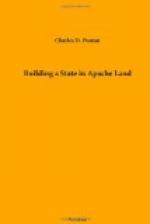In 1857 a company of lumbermen from Maine, under a captain named Tarbox, established a camp in the Santa Rita Mountains to whipsaw lumber at one hundred and fifty dollars per thousand feet, and were doing well, as the company bought all they could saw. They built a house and corral on the south side of the Santa Cruz River, on the road from Tucson to Tubac, called the Canoa. This wayside inn formed a very convenient stopping place for travelers on the road. One day twenty-five or thirty Mexicans rode into Tubac, and said the Apaches had made a raid on their ranches, and were carrying off some hundred head of horses and mules over the Babaquivera plain, intending to cross the Santa Cruz River between the Canoa and Tucson. The Mexicans wanted us to join them in a cortada (cut off), and rescue the animals, offering to divide them with us for our assistance; but remembering our treaty with the Apaches, and how faithfully they had kept it, we declined. They went on to the Canoa, where the lumbermen were in camp, and made the same proposition, which they accepted, as they were new in the country and needed horses and mules. The lumbermen joined the Mexicans, and as they could easily discern the course of the Apaches by the clouds of dust, succeeded in forming an ambuscade and fired on the Apaches when they reached the river. The Apaches fled at the fire, leaving the stolen stock behind.
The Mexicans made a fair division, and the mule trade was lively with the lumbermen and the merchants in Tucson. With the proceeds of their adventure the lumbermen added many comforts and luxuries to their camp at the Canoa on the Santa Cruz, and travelers reveled in crystal and whisky.
About the next full moon after this event, we had been passing the usual quiet Sunday in Tubac, when a Mexican vaquero came galloping furiously into the plaza, crying out: “Apaches! Apaches! Apaches!” As soon as he had recovered sufficiently to talk, we learned that the Apaches had made an attack on Canoa, and killed all the settlers.
It was late in the day; the men had nearly all gone to the mines, and we could only muster about a dozen men and horses; so we did not start until early next morning, as the Mexican said there were “Muchos Apaches.”
When we reached the Canoa, a little after sunrise, the place looked as if it had been struck by a hurricane. The doors and windows were smashed, and the house a smoking ruin. The former inmates were lying around dead, and three of them had been thrown into the well, head foremost. We buried seven men in a row, in front of the burnt houses.
As well as could be ascertained by the tracks, there must have been fully eighty Apaches on horseback. They carried off on this raid 280 head of animals from the Canoa and the adjoining ranches.
There were some companies of the First Dragoons eating beef at Fort Buchanan. The commanding officer was notified, and sent some troops in pursuit, but the Apaches were in their strongholds long before the dragoons saddled their horses.




